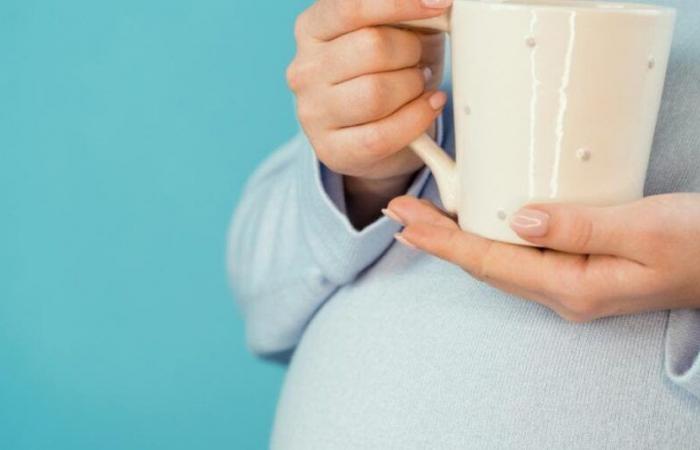Coffee consumption during pregnancy is problematic due to the presence of caffeine. This is because the physiological changes that occur during pregnancy prevent caffeine from being broken down easily. It can therefore cross the placenta and reach the fetus which does not have enzymes to metabolize it. Does this accumulation of caffeine have an impact on the development of the fetal brain?
Can you drink coffee when you are pregnant?
Recently, researchers at the University of Queensland conducted an in-depth genetic analysis of data from tens of thousands of Norwegian families (1). “Scandinavians are among the biggest consumers of coffee in the world, with at least four cups a dayexplains in a press release Dr. Gunn-Helen Moen, from the Institute of Molecular Biosciences at the University of Queensland. And coffee consumption is prevalent during pregnancy.
“Our study used genetic data from mothers, fathers and babies, as well as questionnaires on parents’ coffee consumption before and during pregnancy,” she said. Participants also answered questionnaires about their child’s development until age 8. The study did not reveal no link between coffee consumption during pregnancy and neurodevelopmental disorders in children.
For this research, the scientists used an innovative genetic method, Mendelian randomization, which avoids a potentially dangerous protocol for the fetus. Indeed, Mendelian randomization “uses genetic variants to predict coffee drinking behavior and isolate the effect of different factors during pregnancy”explains Dr. Gunn-Helen Moen. This method "mimics a randomized controlled trial without subjecting pregnant mothers and their babies to harm," she specifies.
Coffee and risk of miscarriage
Previously, these researchers showed that coffee consumption during pregnancy did not affect birth weight or the risk of miscarriage (2). However, as Magali Walkowicz, dietician-nutritionist, explains in The mother-to-be’s food guide, “Several studies establish a link between high caffeine consumption and infertility.”
How many coffees per day when you are pregnant?
Researchers advise expectant mothers to follow medical recommendations regarding caffeine consumption, as caffeine may influence other aspects of pregnancy. The World Health Organization (WHO) recommends caffeine consumption of less than 300 mg per day during pregnancy, or two to three cups of coffee environ.
Decaffeinated coffee during pregnancy
Decaffeinated coffee allows you to maintain coffee consumption, without providing caffeine because a cup of decaf contains approximately 10 to 20 times less than a cup of classic coffee. “If you can, switch to decaffeinated (solvent-free), conseille Magali Walkowicz, or prefer tea, containing less caffeine and rich in antioxidants, or even better rooibos, devoid of caffeine.”
Can you drink tea when you are pregnant?
Tea is, after water, the most consumed beverage in the world. It provides less caffeine than coffee, but still promotes attention. A cup of tea contains about 48 mg of caffeine, about half of a cup of coffee.
There are different varieties of tea: black tea, green tea, oolong tea, white tea, chai tea… The benefits of tea are numerous. They are linked in particular to the presence of antioxidant molecules, flavonoids. Green tea is particularly interesting because it has more polyphenols than black tea and also provides less caffeine, fluoride and aluminum than black tea.
Unlike the teas mentioned above, rooibos, or “red tea”, comes from another plant, native to South Africa. It does not contain theine, but rooibos is strongly antioxidant. Rooibos is prepared like tea.
What to replace coffee with during pregnancy?
Beyond tea and decaf, here are some alternatives to coffee, reduced in caffeine.
Barley coffee, spelled coffee: caffeine-free alternatives for pregnant women
Barley coffee was used as an ersatz coffee during the war. Devoid of caffeine, it is nevertheless antioxidant. To prepare it, you can obtain roasted barley or sachets containing ground roasted barley, available in specialized stores. To brew, soak the sachets or roasted barley in hot water for 5 to 10 minutes, then strain. There are barley coffee producers in France. Likewise, it is possible to find spelled coffee on sale in organic or specialized online stores.
Golden milk for the benefits of spices
Golden milk, or golden milkis a hot drink inspired by Ayurvedic cuisine, made from vegetable milk, turmeric and other spices (ginger, cinnamon, pepper). Depending on the recipe used, it may contain other ingredients such as honey. Devoid of caffeine, it nevertheless allows you to benefit from the benefits of the spices it contains. Thus, curcumin from turmeric has recognized anti-inflammatory properties. The presence of pepper in the drink helps improve the absorption of curcumin by the body.
Mint, verbena… Which herbal tea or infusion is suitable for pregnancy?
Many medicinal plants can be taken as infusions during pregnancy, such as lemon verbena, lemon balm, mint or linden. However, certain plants are not recommended, ask your pharmacist or doctor for advice.
Pregnancy and chamomile
Chamomile belongs to the Asteraceae family. There are two different chamomile plants: German chamomile (Matricaria recutita)and Roman chamomile (the noble Chamamelus). Studies have shown that chamomile can be used as a mild digestive relaxant to treat indigestion, motion sickness, nausea, and vomiting, among other things. The use of chamomile during pregnancy is generally not not recommendeda study showing a higher risk of miscarriage in women who consume it (3).
Anti-thirst drinks suitable for pregnancy
In addition to water, here are some drinks recommended by Magali Walkowicz in The mother-to-be’s food guide : lemon juice, naturally sparkling water, vegetable milks without added sugars, broths, homemade kefir and kombucha with a dose of sugar divided by 4 compared to the classic recipe…
A recipe for fruit kefir
For 1 L of drink:
- 1 L of osmosis, spring or mineral water
- 20 g of fruit kefir grains (you can find them in organic stores or online)
- 1 or 2 organic dried figs (depending on their size)
- 2 slices of lemon
- 20 g of organic sugar (avoid coconut sugar)
Material :
- 1 round airtight glass jar of 1.5 L
- 1 round glass bottle of 1 L (the round shape is important in relation to the gas produced during fermentation)
- 1 funnel
- 1 strainer
First fermentation
Place all the ingredients in the airtight jar (grains, lemon, fig, sugar, water). Close it for a fizzier drink. Shake the jar to mix.
Keep your preparation at a temperature of 20°C.
This first fermentation lasts approximately 24 to 48 hours. The longer the fermentation, the less sparkling the drink will be.
Second fermentation
Filter the preparation. Flavor it to your taste with fruits, spices, flowers (raspberries, ginger, elderberry, etc.).
Pour the flavored liquid into a bottle, and store it at room temperature for another 24 hours.
Place the drink in the refrigerator to slow down fermentation.
To go further: The mother-to-be’s food guide
Read an EXTRACT>>






